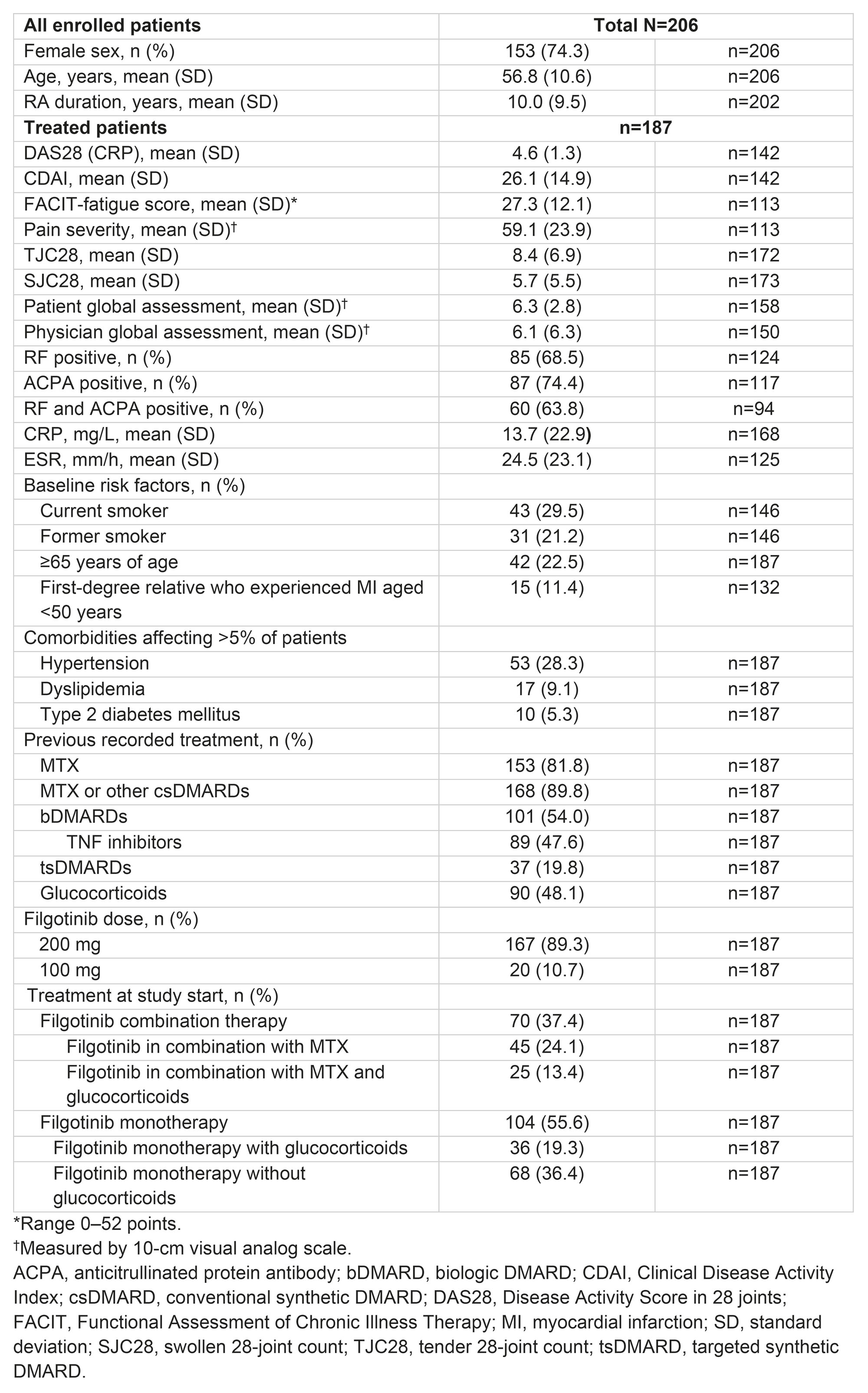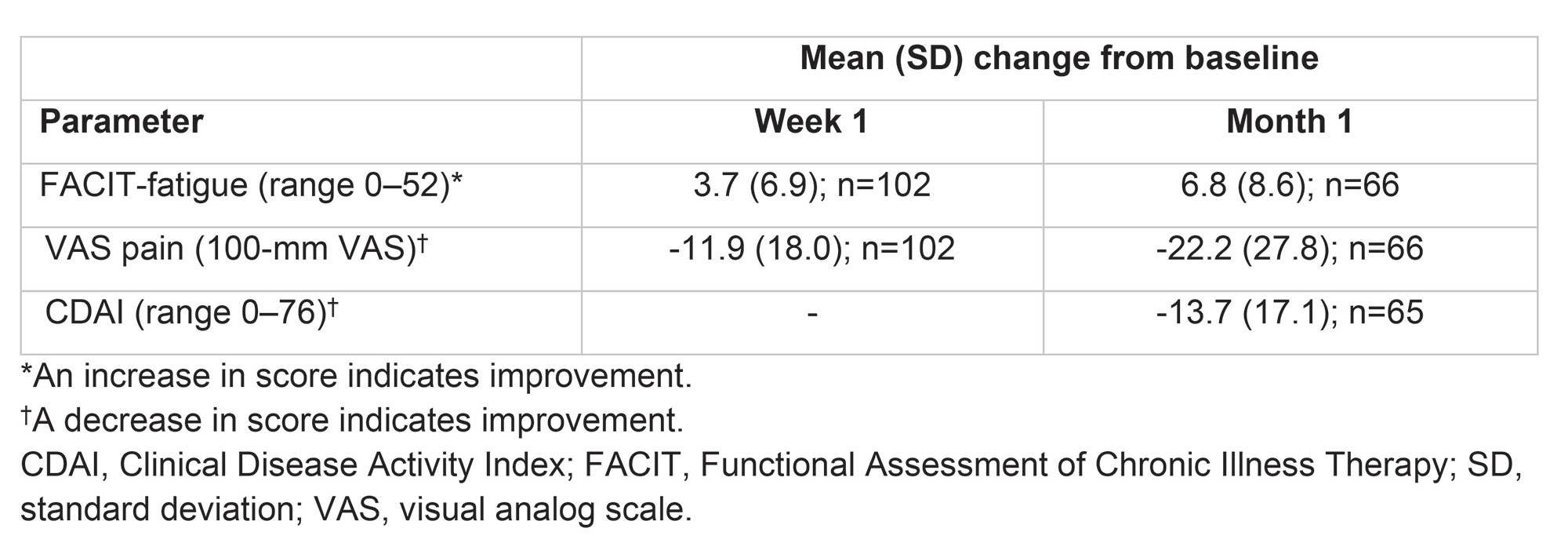Session Information
Date: Saturday, November 12, 2022
Title: RA – Treatment Poster I
Session Type: Poster Session A
Session Time: 1:00PM-3:00PM
Background/Purpose: Filgotinib (FIL) is a preferential Janus kinase 1 inhibitor, approved in Europe for the treatment of RA and ulcerative colitis. A phase 4 European study of FIL (FILOSOPHY; NCT04871919) in patients with RA is ongoing. We report baseline characteristics and 1-month efficacy data from the first 200 patients enrolled.
Methods: The prospective, observational study will enroll approximately 1500 patients aged ≥18 years with moderate to severe active RA, who are prescribed FIL for the first time and in accordance with the product label in general practice. We report baseline demographics, disease characteristics, comorbidities, prior treatments, reasons for starting FIL, and mean change from baseline (CFB) in severity of pain (measured using a 10-cm visual analog scale [VAS]) and Functional Assessment of Chronic Illness Therapy (FACIT)-fatigue score (range 0–52) via electronic PRO data collection at Week 1 and Month 1, and mean CFB in Clinical Disease Activity Index (CDAI; range 0–76) score at Month 1. The proportion of patients with clinically meaningful CFB in FACIT-fatigue (increase of ≥4) and VAS pain (reduction of ≥10) from Week 1 to Month 1 was reported. Patients included in the analysis were enrolled between May 2021 and February 2022.
Results: Table 1). Approximately 40% of treated patients had comorbidities, the most common being hypertension (28.3%), dyslipidemia (9.1%), and type 2 diabetes mellitus (5.3%). Baseline disease characteristics and details of previous treatments are included in Table 1. FIL was started due to inadequate response (43.3%), loss of response (40.6%), or intolerance (non-allergic) to previous treatment (5.9%), or for other reasons (10.2%). Of treated patients, 167 (89.3%) received FIL 200 mg and 20 (10.7%) received FIL 100 mg (study drug information was pending for 19 patients). FIL monotherapy was taken by 55.6% of patients (19.3% with glucocorticoids), while 37.4% received FIL in combination with MTX (13.4% with glucocorticoids). Mean (SD) and median (range) daily dose of oral glucocorticoids (prednisone or equivalent) at baseline was 7.5 (6.0) mg and 5.0 (1.0-30.0) mg. At Week 1 and Month 1, respectively, mean (SD) CFB in FACIT-fatigue score was 3.7 (6.9) and 6.8 (8.6), and mean (SD) CFB in VAS pain score was -11.9 (18.0) and -22.2 (27.8). At Month 1, mean (SD) CFB in CDAI score was -13.7 (17.1) (Table 2). The Figure shows the proportions of patients with clinically relevant CFB in FACIT-fatigue and VAS pain scores.
Conclusion: These are the first international real-world data to be reported from a cohort of patients with RA treated with FIL. At baseline, patients generally had moderate disease activity. Initial interim data indicate rapid improvements in disease measures with FIL treatment (given as combination therapy or monotherapy, with/without glucocorticoids), which could be observed as early as Week 1 for VAS pain and FACIT-fatigue scores. Long-term follow-up is needed to further evaluate effectiveness and safety.
To cite this abstract in AMA style:
Galloway J, Bevers K, Verschueren P, Caporali R, Romero Yuste S, Avouac J, Gvozdenovic E, Harris K, Zignani M, Burmester G. Baseline Characteristics of and Early Outcomes in the First 200 Patients with RA Treated with Filgotinib in a Prospective Observational Study [abstract]. Arthritis Rheumatol. 2022; 74 (suppl 9). https://acrabstracts.org/abstract/baseline-characteristics-of-and-early-outcomes-in-the-first-200-patients-with-ra-treated-with-filgotinib-in-a-prospective-observational-study/. Accessed .« Back to ACR Convergence 2022
ACR Meeting Abstracts - https://acrabstracts.org/abstract/baseline-characteristics-of-and-early-outcomes-in-the-first-200-patients-with-ra-treated-with-filgotinib-in-a-prospective-observational-study/



